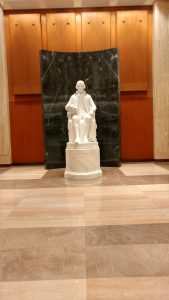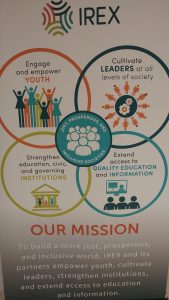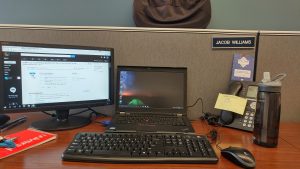Never underestimate the power that the nine-to-five work day can exert upon your daily routine; this is one of the many lessons that I have learned over the course of my first three weeks in Washington D.C., the place where politics meet reality. It is a place where a small-town Midwesterner such as myself can easily fall victim to the overarching tones of rapidity and competitiveness. It is a place where one can find that there exists a clash of understandings. You see it everywhere; the Metro, the workplace, the restaurants, even the monuments. From the outsiders’ perspective, there exists a great divide between how people engage with the world that we share.
It starts as nuance, watching as some individuals rush down the left side of the escalator while others stand idly on the right, not daring to puncture the median threshold for fear of being rebuked by those in much more of a hurry. Those hurried folks then turn into paradoxical figures upon entering the Metro train cars, cramming in so that the car is far over optimal capacity to avoid running late, all while expressing clear body language that indicates a certain distress that comes with the impending burst of their personal bubbles. Yet, once the tranquil humming and shunting of the train begins, trance overtakes the awkwardness of proximity, and once you reach your stop, the mentality takes over again.
These observations are an attempt to place you at the core of my reflective process as I adapt to this perplexing and invigorating city. It would also be fair to admit that I have adapted to my surrounding environment; some of the very strategies that I initially found to be so odd have now become commonplace in my routine. Much of it is concerned with wanting to understand this “East Coast” mentality that I have only briefly grappled with in the past. This place is so different from home, but why? Why do people find it so odd to smile at one another while walking down the street? Why is starting a conversation with a stranger such a rarity here? With my inherent differences, where do I fit into this jigsaw? It leads me to wonder if the “East Coast” mentality is more of a culture centered around getting from point A to point B, whether those points be set in the short term or the long term. It seems odd that one can sense the hallmarks of cross-cultural immersion while within the confines of their country of origin.
This clash of cultures that I am surveying, however, comes secondary to the true reason that I have taken up residence in District of Columbia. My niche here has been found within the ranks of the International Research and Exchange Board, also known by the catchy acronym, IREX. Here, I serve as a member of the Young African Leaders Initiative (YALI) team. Currently, all of my work has been to support the Operations department in organizing the 2017 Mandela Washington Fellowship, a program that has been conducted since 2014 and aims to bring 1000 young leaders from sub-Saharan Africa to experience a summer of coursework at American universities in specialized fields all pertaining to some facet of sustainable development. This is done in an attempt to empower the next generation of African leaders and promote economic and social development at a grassroots level.
As for my part, I had never realized how many moving parts exist in an international non-governmental organization. Our team alone is comprised of nearly twenty incredibly proficient individuals, and there is still an immense amount of work that must be done by each of us to manage 1000 Fellows. Considering that there are many other programs implemented by IREX, one can only imagine the complexity of such an organization and the synergy necessary to ensure that obligations are met and that programs are implemented smoothly. Perhaps it is the high-stakes nature of working with such important programs with such ambitious goals that assist in the formulation of the aforementioned culture that I have begun to adapt.
It goes without saying, but my time in Washington D.C. thus far has been incredibly fulfilling. Working with wonderful people certainly aids in process of acclamation. However, I have found that many of the small changes that I have made in my daily routine coalesce in the constant pursuit of happiness and the staving off of time. For example, riding a bike to work each day has therapeutic and physical benefits; access to museums and historic monuments opens up opportunities to acquire knowledge and understand history; living with impressive individuals doing equally important work is simply empowering; and proximity to politics affords chances to get involved and feel as if you are actually making a difference. Admittedly, I am still unsure of where my time here will lead me, yet the confidence and happiness that I find in a simple day is evidence enough to convince me that I am headed in the right direction, towards a life of leadership and service, underpinned by tenets of truth and justice. I anticipate a fulfilling summer with IREX and my fellow peers, and I can definitively say that it off to an amicable beginning.




